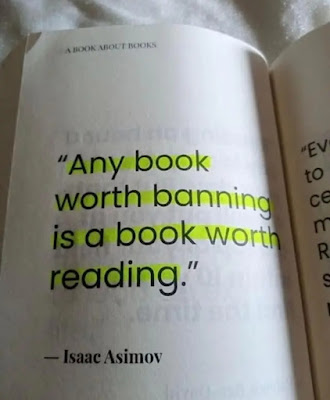Controversial Literature: The Paradoxical Value of Books Worth Banning
by Olivia Salter
In a world where freedom of expression is treasured, the concept of banning books may seem counterintuitive. However, throughout history, numerous books have faced censorship and prohibition due to their controversial content. Paradoxically, it is precisely these banned books that often possess immense value and are worth reading. Whether sparking important discussions, challenging societal norms, or providing historical insight, these books offer unique perspectives that we should not overlook. In this article, we will explore the idea that a book worth banning is in fact worth reading.
Igniting Critical Thinking and Dialogue:
Controversial books have the ability to shed light on difficult topics and challenge the prevailing narratives of society. By raising uncomfortable questions and presenting alternative viewpoints, they encourage critical thinking and open dialogue. When we ban such books, we prevent ourselves from exploring diverse perspectives and stifle intellectual growth.
For example, George Orwell's classic dystopian novel "1984" has faced multiple attempts at censorship. Through its portrayal of a totalitarian regime and manipulation of information, the book warns about the dangers of government control. By reading banned books like this, we engage in critical analysis and foster essential conversations about power surveillance and individual freedoms.
Examining Uncomfortable Histories:
Books that have been banned for their exploration of historical events often offer valuable insights into the past, allowing us to learn from our predecessors' mistakes. Authors who dare to delve into sensitive subjects encourage readers to confront uncomfortable truths and broaden their understanding of different cultures and experiences.
One such example is "To Kill a Mockingbird" by Harper Lee, which has faced bans due to its discussion of racial injustice. Through the lens of Scout Finch, the novel addresses racial prejudice in America during the 1930s. By grappling with this difficult history, we gain empathy, awareness, and a better understanding of the ongoing struggle for equality.
Preserving Cultural Heritage and Identity:
Books that challenge prevailing cultural or religious norms often receive backlash from conservative societies. Despite the controversy, these texts contribute to a more comprehensive understanding of diverse cultures and the complexities within them. By exploring banned books, we gain the opportunity to educate ourselves about the rich cultural heritage of various regions and challenge our own biases and assumptions.
Salman Rushdie's "The Satanic Verses" is a perfect example of a book that faced severe backlash due to its portrayal of Islamic history. It ignited debates about religion, identity, and freedom of expression. By reading and understanding these banned texts, we can bridge gaps in our knowledge and promote cultural sensitivity and understanding.
In conclusion, while the idea of banning books may seem repugnant, there is a paradoxical beauty in exploring literature that challenges our beliefs and society's norms. Books worth banning are often the very books that broaden our horizons, spark dialogue, and encourage critical thinking. By reading these controversial books, we gain a deeper understanding of historical societies and cultures, as well as foster empathy and tolerance.
Supporting the freedom to access diverse ideas, even those that have faced censorship, ensures that we continue to grow intellectually and socially. Rather than dismissing them outright, let us appreciate the value of banned books and recognize that their controversial nature often holds profound lessons for us all.

